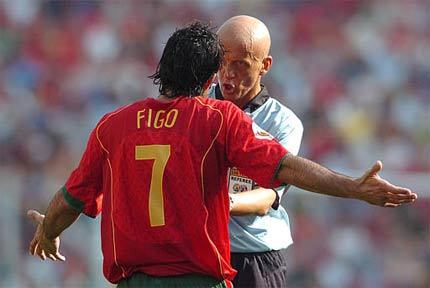I have a reputation. Use it to your advantage, ref.
I have a reputation. Use it to your advantage, ref.


By Eric Beard, follow on twitter
Though I didn’t see the whole match, I did catch the highlights and I saw the dive. No, not that one from Sergio Busquets. Or that one from Angel Di Maria. Or THAT one from Javier Mascherano. No, the match I’m talking about was Manchester United’s trip to Newcastle a while back that finished 0-0. Actually it finished with a dive of pure desperation from Chicharito, which will surely prove to be only a speck of darkness on an otherwise brilliant season from the budding little Mexican. I mean, that one flop won’t be enough to brand ‘diver’ on his forehead for life.
After the match Sir Alex Ferguson was livid as per usual, however, he did provide one quote, though laced with an expected amount of hypocrisy, that deserves some thought. He stated, “Know the players you are refereeing. You would think the preparations for referees should be the same as a manager - prepare yourself, know each player in each team.” Now in Fergie’s world this may mean that Nani would be a patron saint, but referees do watch matches that they’re not refereeing; they know the players amongst them on the pitch. In a modern football landscape where refs cannot keep up with the pace and mischief surrounding the game, why shouldn’t they be able to use the intangibles to their advantage?
For all we know this practice could already exist within some referees, as Pierluigi Collina had an unprecedented level of awareness and interaction with the characters surrounding him, often identifying and confronting players likely to start a scuffle before anything had time to get ugly. So what if a referee has a convoluted angle when a player hits the ground and he’s forced to make an assumption? Would it be in accordance with the spirit of the game if the ref could simply say, “Play on, that’s Robinho (or Gilardino, Gamst Pedersen, Busquets, etc.) on the ground!”? It might not be fair to these select players, but what have they done to deserve the benefit of the doubt?
With all the pressure on the subjective shoulders of one man, would this not be an effective way to stomp out diving and cheating and force grown men to live up to their positions as role models? Of course, referees are protected by football’s (anti-technology) governing bodies and are not forced to give reasoning on their decisions. But referees need our protection too, and it’s the divers, the shirt-grabbers, the off the ball elbowers, the constant moaners, that often generate the toughest decisions and, in turn, the harshest criticisms.
When ensuring you can always get the decision right fails, just make the formula a simple one. In this case, the simplicity lies in making the game harder for the players with dishonest reputations than for everyone else. Because if refereeing is honestly an impossible job to get perfect given the game’s current run of play, then why not make it impossible for those who cannot be honest on it?







